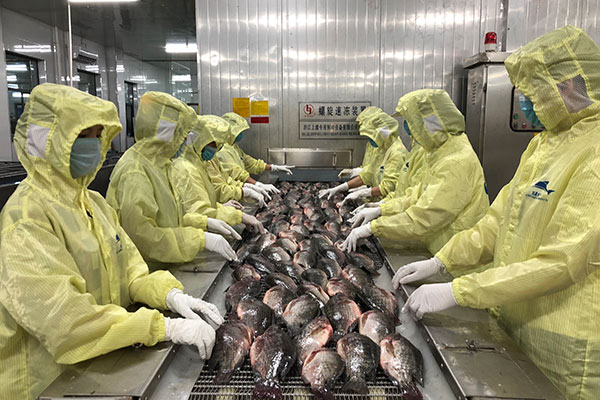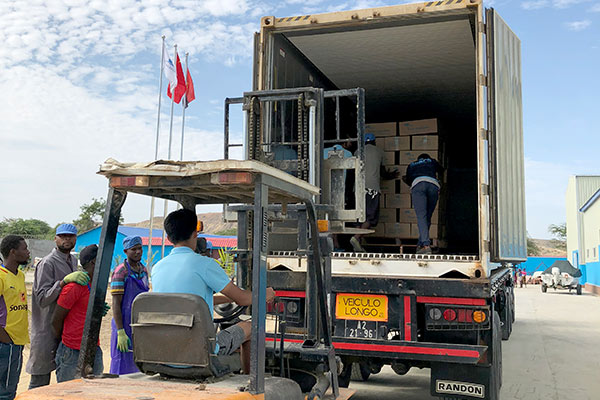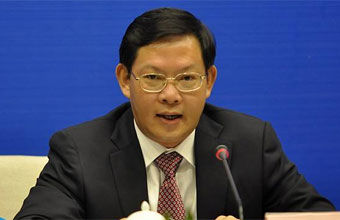Home> Biz Updates
Fishing for seafood glory in Africa

Workers at Zhanjiang-based Jingchang Aquatic Product, the domestic unit of Fuhai Atlantic, process Africa-bound tilapia variety of fish on June 25. [Photo provided to China Daily]
Having netted big profit and bright reputation in Angola, Fuhai Atlantic eyes world
Meng Qingyong, 53, who founded Fuhai Atlantic Fishing Co Ltd in 2016, never thought the seafood firm would emerge in just one year as the leader with 30 percent market share in Angola in southwestern Africa.
"We never expected the success," said Meng. "I didn't even know Angola before I stepped into the business there. I was reluctant about the investment."
Yet, Fuhai Atlantic invested 100 million yuan ($15.38 million) in Angola in 2017. Average monthly profit of 300,000 yuan in 2017 in Angola appears to suggest that the return on investment was very good.
For the first quarter this year, Meng's Fuhai Atlantic achieved 50 percent growth rate in revenue compared with that of last year.
The firm has six fishing vessels, each capable of catching about 200 metric tons of fish per day. Its main catch in Angolan waters is the European pilchard, a species of ray-finned fish. It is sold mainly to local and European markets.
"Our products from Angola don't travel to China as the two countries have different quality inspections for imports," said Meng.
In China, Fuhai Atlantic operates as Zhanjiang Jingchang Aquatic Product Co Ltd. "The China market for aquatic products has become more competitive and less profitable," said Meng.
"That was the very reason why we decided to go global. Favorable policies such as tax cuts in overseas markets, and mega projects such as China's Belt and Road Initiative, were also an important reason."
But the go-global strategy was not easy to implement. "We (company officials) didn't know foreign languages. We had trouble finding the right places to set up our factories, and had difficulties negotiating with local governments," said Meng.
Communications with local residents also posed problems. "Some local residents have biased opinions about us setting up factories, especially as ours was the first attempt in that village," said Meng. He was referring to Fuhai Atlantic's seafood processing and packaging factory in Benguela, a city in west Angola.

Workers at Fuhai Atlantic's seafood processing unit in Angola dispatch frozen ray-finned fish for export to neighboring Democratic Republic of Congo on June 25.[Photo provided to China Daily]
Fuhai's travails are consistent with the experiences of many Chinese companies that went global in recent years.
According to a report from the Research Center for Corporate Social Responsibility at the Chinese Academy of Social Sciences, 32 percent of State-owned enterprises surveyed said they needed a better understanding of local cultures and legal systems to succeed overseas and carry out corporate social responsibility efforts.
"The communication process is becoming smoother as we are very sensitive about local ecology and environmental protection," Meng said, adding Fuhai also received help from other Chinese companies that set up branches in Africa.
"We aim at joint development for mutual benefit," said Meng. "We believe that is the key to long-term development."
Fuhai has also set up training courses for local workers in Angola to teach them advanced fishing and processing skills. As part of its corporate social responsibility, it offers electricity to nearby villages and helps in the construction of local roads.
"Recently, we donated a church to local residents in Angola," said Meng. "We think mutual respect is of vital importance."
Meng said Fuhai's efforts have been recognized and appreciated by local residents. "We have a good reputation among local residents. Many of them want to work in our factory. And many others' lives depend on the salary they earn from their jobs with Fuhai."
Meng said average monthly wage works out to about $80 per month, which is 60 percent more than what other local companies pay. Typically, the average monthly wage in the region tends to be $50 per month.
Besides Fuhai, some 16 Zhanjiang-based enterprises have set up overseas branches in economies involved in the Belt and Road Initiative.
Globally, 29 Zhanjiang-based companies have established 42 overseas branches and three trade-related organizations abroad, according to Deng Shan, an official from the Zhanjiang Bureau of Commerce.
The city has seen two-way traffic. "Last year, 43 overseas business associations signed agreements with the city for cross-border trade," said Deng.
According to Huang Tianxiang, another official from the Zhanjiang Bureau of Commerce, the city is ramping up efforts to foster a better business environment for inbound investment, and encourage local companies to invest overseas.
"Measures include a simplified procedure for customs clearance and digital apps for inspections," Huang said.

 Print
Print Mail
Mail 5G construction supports Zhanjiang's high-quality development
5G construction supports Zhanjiang's high-quality development
 Acting mayor inspects project construction in Xuwen, Leizhou
Acting mayor inspects project construction in Xuwen, Leizhou Zhanjiang island an "egret paradise"
Zhanjiang island an "egret paradise"  Dancing egrets add vitality to Xiashan
Dancing egrets add vitality to Xiashan